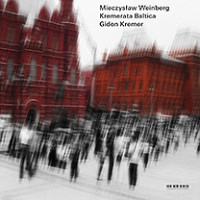Personal Discoveries: Mieczysław Weinberg
|
Mike Silverton [March 2014.]
My first taste of Mieczysław Weinberg’s music arrived by way of a Shostakovich string-quartet survey by the Pacifica Quartet, Cedille CDR 90000 127, 90000 130 and 90000 138. The two-CD set includes single quartets by Prokofiev, Miaskovsky and Weinberg’s Op. 35, his sixth of a total of 17 – the quartet I later learned that put him in bad odor with the Soviet Union’s cultural henchmen. Perhaps a tad solipsistically, I was surprised that music of this quality should be so little known. Soon after, having learned of their existence, I requested for review the entirety of the composer’s string-quartet output on six cpo CDs (777 313-2, Nos. 4 and 16; 777 392-2, Nos. 7, 11 and 13; 777 393-2, Nos. 6, 8 and 15; 777 394-2, Nos. 5, 9 and 14; 777 566-2, Nos. 1, 3, 10, Capriccio, Op. 10, and Aria, Op. 9; 777 587-2, Nos. 2, 12 and 17, performed by the Quatuor Danel: Marc Danel, Gilles Millet, violins; Vlod Bogdanas, viola; Guy Danel, cello. Naxos distributes cpo). After numerous sessions in which familiarity might possibly breed, if not contempt, a much diminished enthusiasm, one’s strong impression holds. Weinberg (1919-1996), having fled the Holocaust to, ultimately, Moscow, struck up a friendship with Shostakovich in the shape, among other collegial aspects, of an affable string-quartet competition. Certain, largely slight, resemblances are inevitable, as aspects perhaps of an era’s fraught Zeitgeist as much as familiarity. I can’t say it often enough – how puzzling that Weinberg’s name doesn’t figure larger in the 20th century’s pantheon. To be honest, I wondered whether he was equally effective in other than this very large collection of handsomely crafted (and very well performed) quartets the emotional aspects of which are never less than genuine, and often solemn running to dark. I soon enough had an answer. For this needful listener, ECM 2368/69, with Gidon Kremer as soloist and concert master of the rather immodestly named Kremerata Baltica, arrives in timely fashion as a Year’s Best. Seldom does one have his curiosity answered in so compelling a fashion. I doubt that Weinberg could be better served. The first disc’s offerings: Sonata No. 3, Op. 126, in Kremer’s estimation among the age’s best; Trio, Op. 48 (a personal favorite), with Kremer, violin, Daniil Grishin, viola, Giedré Dirvanauskaité, cello; Sonatina, Op. 46, Kremer, violin, Dirvanauskaité, cello. The second disc consists of two remarkably fine larger works: Concertino, Op. 42, for violin (Kremer) and string orchestra; and Symphony No. 10, Op. 98, for string orchestra. The three-part Concertino (Allegretto cantabile, Lento, Allegro moderato poco rubusto), composed in 1948, could charm the birds out of the trees, and yet, within it, one hears traces of melancholic yearning. One also hears what he first detected in the quartets: Consummate craftsmanship – Weinberg seems to have taken much satisfaction in handsomely designed musical structures. Kremer as soloist, with his excellent ensemble, sounds to me faultless, as does the recording. That comment above about a Year’s Best is in large measure inspired by a work I know I’ll play often. The very different five-part Tenth Symphony, Op. 98, composed in 1968 (Concerto Grosso, Grave; Pastorale, Lento; Canzona, Andantino; Burlesque, Allegro molto; Inversion, L’istesso tempo) begins with a dissonant heavy hand that transitions – unconventionally – to a briefly sprightly concerto grosso. A restatement of the movement’s tragic opening concludes. Indeed the motif appears throughout in several guises as do the concerto grosso’s four instrumentalists. This is a sobering, great hearted work that needs to be listened to with undivided attention. The weight and authenticity of the small ensemble’s performance couldn’t be more persuasive. Wolfgang Sander’s fine notes, now and then at odds with my own responses, will help. The annotator makes much of the anti-Semitism that harried Weinberg throughout his life, including his touch-and-go survival of the Soviet version. Shostakovich did what he could to protect the younger man. Hugely recommended!
[More Mike Silverton]
[More
Weinberg]
[Previous Article:
Atopos Survey 1. / Italian Vacation 11. / Piano Factory 12.]
[Next Article:
Ensemble Klang’s Colors and Melodies]
|
